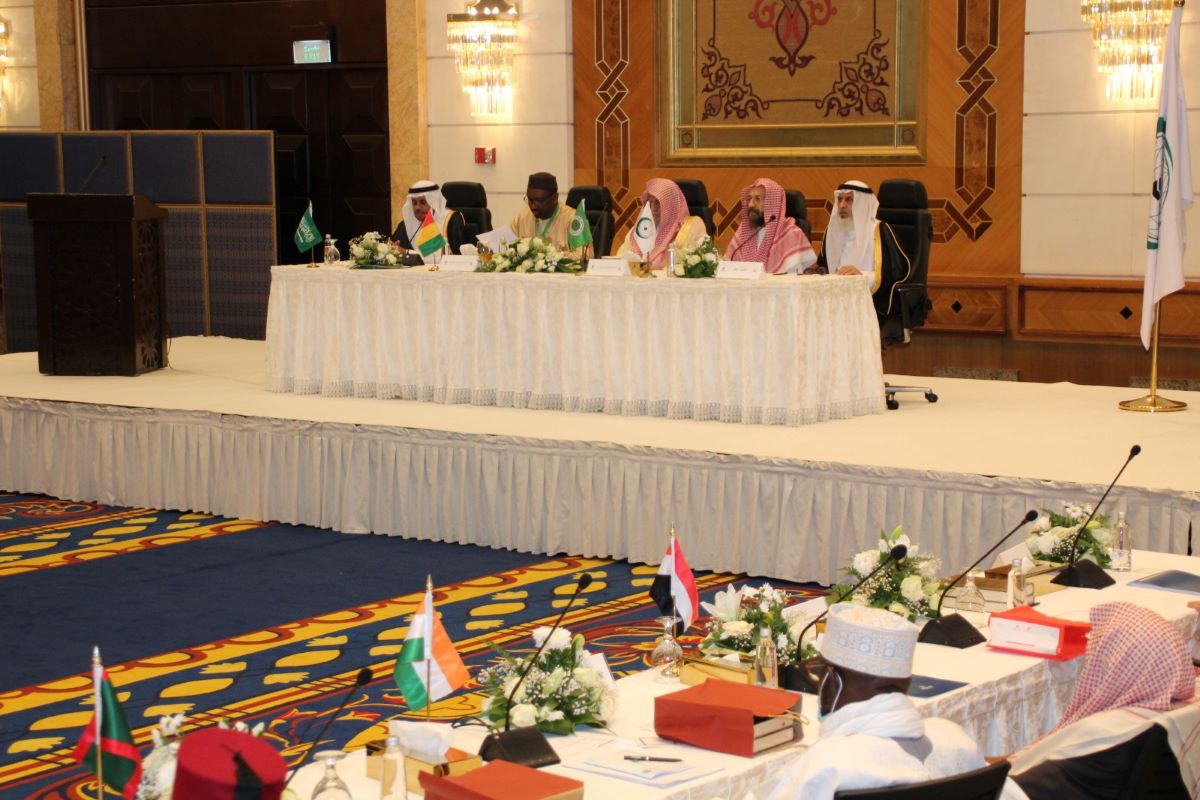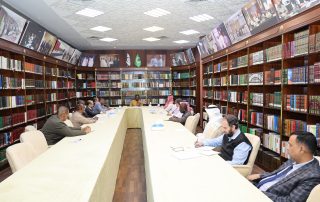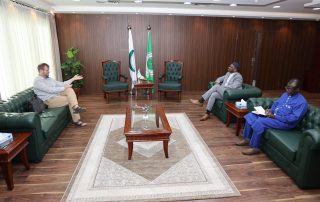
The twenty-fifth session of the International Islamic Fiqh Academy (IIFA) concluded its activities on Thursday evening 03 Shabaan 1444H correspondent to 23 February 2023G in Jeddah, Saudi Arabia, after four days of deliberations to discuss contemporary jurisprudential issues and issue Shariah resolutions on them.
At the closing ceremony of the session, His Excellency the Permanent Representative of the Kingdom of Saudi Arabia to the Organization of Islamic Cooperation (OIC), Dr Saleh bin Hamad Al-Suhaibani, affirmed the continuation of the Kingdom under the leadership of the Custodian of the Two Holy Mosques King Salman bin Abdulaziz Al Saud, and his Crown Prince, HRH Prince Muhammad bin Salman, to provide all forms of support for the blessed efforts of the Academy.
Ambassador Al-Suhaibani pointed out that this generous support from the Kingdom’s government to the Academy stems from its keenness to unify the Muslim Ummah and realize intellectual harmony and integration between scholars and jurists in a way that benefits Islam and Muslims in various parts of the world.
“This support is also driven by the Kingdom’s recognition of the importance of the IIFA and the great service it delivers to Muslims worldwide to rationalize their intellectual, scientific and jurisprudential approaches and bring them closer in this field,” he added.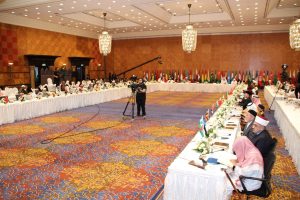
The Saudi diplomat expressed his hope that the results of this session, held under challenging circumstances regionally and internationally, would articulate the ability of the glorious Shariah to find solutions and address all emerging issues and problems of the current era.
“This is achieved through a bright jurisprudential vision and creative methods based on moderation to realize people’s interests and contribute to security and stability in all Islamic countries, following the purposes of the tolerant Islamic law.”
He stressed that the hope is that scholars present the tolerant Shariah in a way that eliminates the impurities that some extremist groups have attached to it, highlights its advantages and precious values, and showcases its unique ability to address contemporary problems and achieve human happiness in this world and the Hereafter.
Al-Suhaibani also voiced his hope that Muslim scholars confront the new methods of atheism and deviation that have begun to invade some of the Ummah’s youth and consider how to utilize the modern technological revolution to that end.
In turn, His Excellency, the Secretary General of the Islamic Chamber of Commerce, Industry and Agriculture, Dr Youssef Khalawi, stressed that the challenges facing the IIFA are enormous, and our responsibility is to unite to respond to them.
The session’s rapporteur, Sheikh Dr Thaqil bin Sayer Al-Shammari, reviewed the topics discussed in the session and its resolutions.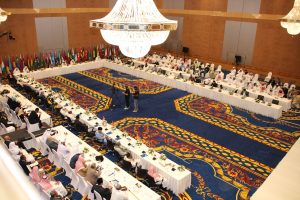
Al-Shammari stated that the session issued resolutions on various subjects discussed during the session, including resolutions on “clarifying the shariah ruling on compulsory education (religious and worldly) for both males and females in Islam”, “the impact of Corona pandemic on the Shariah rulings on worships, family and crime”, “the impact of Corona pandemic on the legal rulings on contracts, transactions, and financial liabilities”, “the ruling on performing prayer (Salah) in a language other than Arabic”, “the ruling on following a prayer by listening to the mobile phone or the radio”, and “clarifying the rulings concerning social media and its principles”.
He noted that the session had postponed the issuance of resolutions on other subjects.
After that, the IIFA Secretary General, His Excellency Professor Koutoub Moustapha Sano, read out two statements issued by the Council of the Academy.
In the first statement, the Council expressed its full solidarity with the peoples of Turkey and Syria after the devastating earthquake that struck the two countries, calling on the Muslim Ummah and the international community to provide them with relief and the assistance they need through official and reliable authorities.
In the second statement, the Council denounced the burning of copies of the Holy Qur’an in a number of countries.
The Council stressed its condemnation in the strongest terms of the burning of copies of the Quran by some extremists in Sweden, Denmark, and other countries as an expression of their deep-seated hatred against a religion professed by approximately two billion people in the world and as a confirmation of the growing disease of Islamophobia in thought and behaviour.
The Council reaffirmed that such reckless and irresponsible behaviour and mob actions did not and will not undermine the sanctity of the Holy Qur’an.
The Council affirmed that these mob actions would not change the status of the Noble Qur’an in the hearts of Muslims but rather increase its strength, love, and consolidation.
It called on states, institutions, and international organizations to enhance cooperation and coordination to confront irresponsible behaviour that disrespects sanctities and religious symbols and collaborate to issue international resolutions criminalizing such heinous actions.
The Council also called on countries and Islamic organizations to file lawsuits in the competent courts against anyone who committed such crimes against Islam, its Prophet, and its symbols.
The IIFA Secretary General read two telegrams of thanks and appreciation from the Council of the Academy to the Custodian of the Two Holy Mosques, King Salman bin Abdulaziz Al Saud, and the Crown Prince Prime Minister, HRH Prince Muhammad bin Salman, for their unlimited support for the IIFA twenty-fifth session, and their continuous support for the Academy.
The two telegrams included a commendation from the IIFA’s Council and scholars for the great efforts that the Custodian of the Two Holy Mosques and his government exert in Islamic affairs, the defence of the Ummah’s issues, the honourable service of the Two Holy Mosques and the holy sites, and the great care of the Hajj performers.
They also praised the comprehensive progress the Kingdom of Saudi Arabia is witnessing under the wise leadership of the Custodian of the Two Holy Mosques, which elevated the Kingdom to the ranks of developed countries.
The IIFA Secretary General also read a telegram of thanks and appreciation from the Council of the Academy to Prince Khalid Al Faisal, Advisor to the Custodian of the Two Holy Mosques, Governor of Makkah Al-Mukarramah Region, for his patronage of the IIFA twenty-fifth session.
For his part, His Excellency the IIFA President, Sheikh Dr Saleh bin Abdullah bin Humaid, confirmed in his speech that the twenty-fifth session ended with good results following the scientific method and ijtihad reasoning.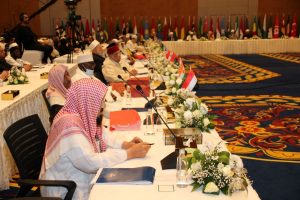
He explained that this kind of ijtihad is based on a firm foundation of scientific and thoughtful research and driven by the desire to enable Muslims to confront emerging problems by providing appropriate solutions that draw upon Islamic law and respond to the needs of the times through explicit and authentic ijtihad.
“Islamic Shariah has met the needs of people at all times and places due to its principles and rules that are flexible and aimed at bringing about benefits and avoiding detriments,” he stressed.
Sheikh Saleh affirmed that the Islamic Shariah is still and will remain full of vitality and richness, as it can realize humankind’s happiness whenever it is implemented.
He called on scholars to work eagerly to serve the Muslim Ummah and humanity as a whole by deducing jurisprudential treatises that deal with people’s lives, address their problems, and present them in renewed forms according to the methods used in academic studies.
“The importance of Islamic jurisprudence in our Muslim societies is evident in that it deals directly with the life of the individual, the family and society, and relations with non-Islamic societies. It is also evident in that it works to issue fatwas and studies based on the principles of the true religion and consistent with new development,” he said.
The current session, held from 20-23 February 2023, witnessed the participation of 200 scholars from the OIC member states with expertise and specialization in Shariah disciplines, economics, medicine, and sociology to discuss 160 research papers on the issues and topics of the session.
The IIFA is a universal scholarly organization and a subsidiary organ of the OIC. It was established following a resolution at the Third Islamic Summit in January 1981, with a headquarters in Jeddah, Kingdom of Saudi Arabia.
The IIFA’s members are eminent Muslim jurists, scholars, researchers, and intellectuals who specialize in jurisprudential, cultural, educational, scientific, economic, and social fields of knowledge from different parts of the Muslim world.
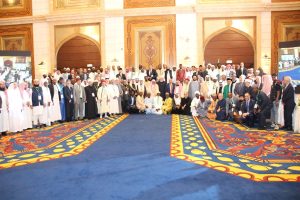
Read Also
Lastest
